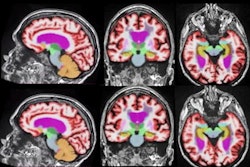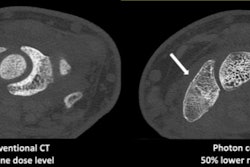Dear AuntMinnie Member,
It's no secret that the recently approved drug aducanumab (Aduhelm) has fallen short of expectations as a treatment for Alzheimer's disease. But are there other drugs in development that might perform better?
One such drug is donanemab, which is being developed to attack Alzheimer's disease by clearing amyloid plaque deposits in the brain that are linked to the condition. In a recent study, researchers from donanemab's developer, Eli Lilly, published results that used PET scans to demonstrate the drug candidate's ability to clear plaque from the brain.
For other stories in our Molecular Imaging Community, check out the following:
- Could scientific fraud be commonplace in nuclear medicine journals? Researchers from the Netherlands think so, based on the results of their survey.
- Radiation dose in PET/MRI scans could be reduced by up to 90% by adjusting PET image acquisition times to line up with those of the MRI component of the scanner.
- PET image with a prostate specific membrane antigen gallium 68-based radiopharmaceutical could spare many prostate cancer patients from surgery.
- The formation of a new joint-venture company was announced this week that is going to develop new theranostic radiopharmaceuticals for cancer.
News from ISCT
In other news, the International Society for Computed Tomography (ISCT) convened its 22nd annual symposium on Thursday, and Editor Kate Madden Yee is on the scene in San Diego reporting on the proceedings. It's the first time since 2019 that this important symposium on CT has been held.
The meeting got off to a fast start with a discussion of one of the hottest new technologies in medical imaging, photon-counting CT. The technology has stirred excitement since the first commercial system was cleared for marketing in September 2021, and it offers the promise of higher-resolution images at a lower radiation dose, according to two Thursday presentations at ISCT 2022.
Another presentation pondered the potential role of CT in population management. For example, low-dose CT combined with artificial intelligence could detect additional pathologies in a form of opportunistic screening.
Get these stories and more news about CT in our CT Community.
Osteoporosis webinar
Finally, be sure to check out our next webinar on Wednesday, September 21 at 12 p.m. ET, entitled Advances in Osteoporosis Screening: Finding More Patients at Risk. We've got a great lineup of key opinion leaders in radiology to discuss the latest developments in osteoporosis screening, so reserve your seat today!



















